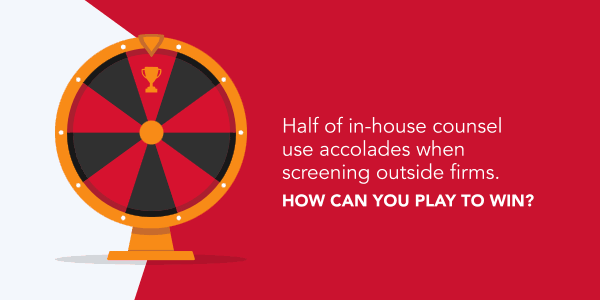The legal industry may have a love-hate relationship with awards and rankings, but these credentials do have a significant role in the marketing mix: According to Greentarget’s State of Digital and Content Marketing Survey, half of in-house counsel say these accolades are important factors when screening new outside firms. That increases to 56 percent for the C-Suite.
Together, awards and rankings were viewed as more important than blogs, social media and quotes in relevant publications.
Award season beckons: This month alone sees deadlines from the World Trademark Review 1000, Benchmark Litigation and U.S. News & World Report/Best Lawyers in America’s “Best Law Firms,” among others. Soon, the annual parade of Chambers deadlines will be among us.
How can you play to win?
One: Make a plan.
Go into award season with a plan. What are the awards that are most important to you? What awards have demonstrated credibility in the marketplace? For what awards are you an ideal candidate – whether age, level of experience, geography, et cetera? (Be honest here. There’s a season in your life for 40 Under 40, and there’s a season in your life for Leading Practitioners, and they rarely intersect.)
If you are not sure which awards to prioritize, look at some of your leading competitors and role models. What do they tout on their bios?
Two: Be selective.
There is a cottage industry of awards run by enterprising folk looking to capitalize on lawyer egos. Watch out for some of the frequent red flags:
- Pay to play. Generally, the most reputable honors do not require any money to participate. (They will look to upsell you on profiles and ads and badges and cufflinks later, sure, but there is no charge to be evaluated.)
- Be wary of any new award that comes to you directly after you’ve received another; many fly-by-night rankings simply browse the winners of other awards and try to sell a $500 plaque with a new name at the top.
- Overall shadiness. Look for misspellings, typos and missing words. Scam rankings are often sent under a very common name, like “Michael Smith,” so you cannot find them on LinkedIn.
While an invitation to be honored is very flattering, keep your ego in check: If you have never heard of a given award, it’s likely your clients haven’t, either.
Three: Look at precedent.
For your priority awards, who won last year? What common threads can you determine? If it’s an individual award, do the winners seem to have a high level of community service, leadership positions in their firms, et cetera? For team accomplishments, is there a certain size of matter considered – verdict, settlement or deal size? These can provide clues as to what the judges are looking for – and how your odds shape up.
Four: Provide context.
While you are intimately familiar with your clients and projects, you cannot assume the award judges are. For example, most of the research analysts at Chambers & Partners are based in London; you cannot expect them to have in-depth knowledge of the real estate market in Alabama. Educate.
Do not submit an anemic blurb like “Advised XYZ Company on new location” and expect the judge to know what XYZ Company is or does. Fill in the details: “Advised XYZ Company, a publicly traded baker and distributor of bread and desserts, on all aspects of its sixth bakery facility, which is expected to add 200 new jobs to Smallville, Kansas. Our firm has advised XYZ Company, a long-time client, on its past four real estate deals, expanding its market across the U.S. It has grown by more than 300 percent since its IPO.”
This need not be a heavy lift; often, the color commentary is available with a few clicks on your clients’ websites. Annual reports and press releases are invaluable sources of such information.
Five: Make an argument.
Keep in mind the judges will see a plethora of award entries, many of which simply extoll the virtues of the nominee. And many of which will elicit a “so what” from a judge who is pressed for time and stuck skimming through a stack of indistinguishable nominations.
Every award entry should make a case: “Lois Lane merits inclusion in this year’s Forty Under 40 for three primary reasons: x, y and z.” “Kent & Luthor is the leading litigation boutique in the Rocky Mountains because a, b and c.”
Start your entry with an opening statement, and back it up in the following paragraphs.
Six: Follow the rules.
Again, make it easy on the judges. Don’t make it a burden to evaluate the firm. Make the deadline. Meet the criteria. Use the portal. (Even if the instructions say you do not technically have to use the portal, use the portal. Who would you be more sympathetic to – the firm that enters everything in your system or the firm that requires extra work of you?)
Seven: Never surprise your client.
Whether you are using a client as a reference or as a work example, your request must be made clearly and well in advance. If you are asking for a reference, manage the expectations for when they will be contacted, how they will be contacted (email, phone, et cetera), and what kinds of questions they can expect. If you are using a client project as a representative matter, get permission in writing.
Eight: Beware “reference fatigue.”
Throughout the year, a number of rankings may ask for client references. Do not share the same people for all; this gets annoying fast. Work to determine the timelines for specific rankings, and stagger your requests so no one contact is receiving more than two queries about you each year.
Moreover, develop a central rankings clearinghouse of sorts: If one particular client happens to have relationships with various practice areas at the firm, ensure this client is not being listed on every practice group’s nominations.
Nine: For references, prioritize responsiveness.
Someone who answers the phone is a better reference than a figurehead who will not. If the general counsel won’t participate but the paralegal will, use the paralegal. There is no extra credit for seniority.
Ten: Share good news.
Once you earn an award, announce it in good taste: Share it on social media. Add it to your biography and marketing materials. Thank your references. Send the article to your mom.
As with all marketing, effective award competition is about empathy: Have empathy for the judges by showing that you understand the award, the parameters, the deadline and their process; make it easy for them by presenting a clear and well-evidenced case. Have empathy for your references by making reasonable, well-explained asks, and by respecting client confidentiality.
Empathy helps when marketing your awards, too: Remember that awards and honors – like “USDA Approved” – can indicate a safe choice. Use awards as visual cues that you are a safe and reliable choice, and deliver in a way that befits the honor.

